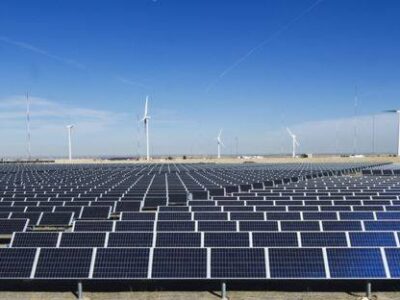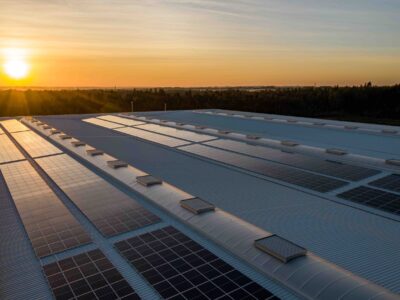Software as a service (SaaS) startup Aurora Solar, which develops tools that allow solar professionals to remotely design and sell solar, recently shared that it raked in an impressive $50 million in a Series B funding round. The round was led by private investment firm ICONIQ Capital with continued participation from existing investors Energize Ventures, Fifth Wall, and Pear VC. That puts the San Francisco-based company’s total investment above $70 million after netting $20 million in a Series A round early last year.
Aurora’s software, co-founded by Christopher Hopper and Samuel Adeyemo in 2013, has proved to be especially valuable during the coronavirus pandemic. The company has actually seen its business increase in 2020 as residential solar companies have moved more operations online–a clear indication of the important role software will play as solar continues to grow.
Companies like Aurora have boosted efficiency and have helped the solar industry transition from traditional kitchen table sales to selling virtually at an expedited pace. The company says that projects designed using its remote-modeling software have surpassed four million, with a record one million coming from April through October of this year alone. Its clients include some of the industry’s largest players like Vivint Solar and Sunpower, according to Greentech Media.
As Aurora co-founder and CEO, Christopher Hopper explained during an interview with Consensus, “Historically, before we came to the industry, people were literally driving out to every site and climbing on the roof, taking roof measurements, taking shade measurements and then driving back and sticking them in the computer into spreadsheets and so forth. That made for a very inefficient process. One of the key innovations that we pioneered was the concept that you can design solar remotely from your office with that pristine and that scale. That’s been a shift that’s been on the way for a while, but with COVID now, the site visits and the knocking on doors was just not possible in many parts of the country. Within a matter of months, it accelerated that shift.”
The company’s software allows solar installers to streamline the solar design and sales process. This includes making it possible to remotely model the site, perform solar shading analysis, conduct a customer energy consumption profile, design rooftop systems, and simulate energy production. The software also lets users compare financing options and create sales proposals.
Aurora’s mission is to “streamline the solar sales design process and take out as many inefficiencies as we can, with the ultimate goal of making solar achievement an affordable source of energy for everyone – that’s what gets us excited,” Hopper says.
In a separate statement to Consensus, he broke down how Aurora’s efficient process can help cut the cost of solar.
“One thing that many people aren’t aware of is that more than half of the cost of a residential solar installation is soft cost, meaning non-hardware cost (customer acquisition, design, permitting, etc.), he said. “This means that of the, say, $20,000 on a solar installation, the solar panels, and electrical components are only $7,200.” Hopper noted that if there were “a more efficient way of getting solar onto people’s roofs, then the cost of solar could be half of what it is today!” He continued, “by streamlining the process of going solar from lead to permit through a platform that allows installers to cut site visits, engage prospective customers, communicate the solar value proposition and make data-driven design decisions at scale, we help reduce soft costs.”
The startup plans to use the new funding to enhance its platform and create more products and services to support its clients, Hopper explained. The money will also be used to continue hiring across Aurora’s teams. Today, the company employs over 100 people in San Francisco and around the country – a number the CEO says it hopes to double next year.
He adds that one of Aurora’s major initiatives this year has been helping to empower salespeople with the right tools to have virtual kitchen table conversations and communicate the planning process with homeowners.
“We want to empower more and more of the solar sales design process – anything from lead to the install – and doing that in the most efficient manner so that we can help our clients grow their businesses.”
According to Hopper, Aurora’s software is prolifically used across the solar industry. While he acknowledges the significance of industry leaders using the software, the CEO emphasizes that the use of Aurora’s services by smaller companies and at the local level is just as important.
“A majority of the top 10 solar companies in the U.S. are using Aurora to run their business, but also many smaller companies and medium-sized companies,” said Hopper. “This is very much in line with our vision – we want to provide the platform and tooling that helps people anywhere be efficient at putting solar on people’s roofs. We have mom-and-pop shops all the way to publicly-traded companies on our platform.”
Despite Aurora’s success and the accelerated transition to remote installation planning, Hopper says there is still plenty of work to be done and that the challenge keeps him moving forward.
“These are the early innings of solar,” he noted. “We’ve obviously had a tremendous growth phase, and it’s exciting to see all that success that our clients are having on the platform. But what gets me even more excited is where this is headed because it’s an important change that’s coming.”





